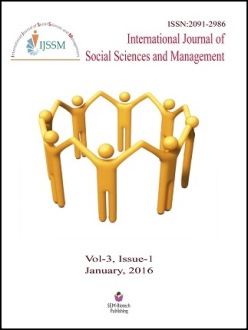Biocultural Dynamics of Teenage Pregnancies in Ethiopia: Medico Anthropological Appraisal
DOI:
https://doi.org/10.3126/ijssm.v3i1.14368Keywords:
Reproductive health, adulthood, teenage pregnancies, transactional sex, peer pressure, sexual assaultAbstract
Teenage pregnancy is a burning public health and demographic problem in Ethiopia.The adolescent girls of rural regions in Ethiopia account for alarming higher proportion of teenage pregnancies and contribute serious threats to health and development interventions by the Government.Teenage pregnancies and adolescent reproductive health hazards are burning global issues which have obstructed effective implementation of agenda of Millennium Development Goals (MDGs). The UNICEF estimates that 80 per cent of teenage pregnancies are reported in least developed countries of the world.The multiple socio-cultural factors such as lack of parental control and guidance, gender inequality, poverty, social exclusion, peer pressure, adoption of transactional and intergenerational sex by unemployed adolescent girls in poor homes as coping mechanism, gender based sexual assault prevailing in and around schools have stimulated increased teenage pregnancies in rural regions of Ethiopia.This paper based on review of research articles and research synthesis argues that teenage pregnancies is a national concern of Ethiopia preventing a significant section of adolescent girls availing access to preparedness for adulthood, exercising reproductive rights, opportunities for skill development, education, safe sex and reproductive health.This paper is an attempt to develop framework of research hypothesis and research questions to be adopted for further research on this thematic area.In rural regions of Ethiopia, increased number of women headed families coupled with rising poverty; unemployment and family disorganization breed sexual exploitation of adolescent girls exposing them to high risk sexual transmitted diseases and HIV/AIDS.The growing teenage pregnancies in the country have drastically affected achievement of agenda in Millennium Development Goals (MGDs) in term of reduction of maternal death by 75 percent by 2015.The health inequalities is a major contributing factor to deprive women of equal opportunity and availing access to reach her health potential irrespective of social status, ethnicity, gender, religion and economic status.The socio-economic conditions of family and community in rural regions of Ethiopia contribute to increasing teenage pregnancies and adolescent motherhood.These factors are inadequate opportunity in community level for positive youth development, illiteracy, poverty and limited employment opportunities.The study recommends for a comprehensive community driven approach promoting childhood interventions and adolescent development programme towards minimizing unintended teenage pregnancy and gender discrimination prevailing in rural and urban region of Ethiopia.
Int. J. Soc. Sci. Manage. Vol-3, issue-1: 68-77
Downloads
Downloads
Published
How to Cite
Issue
Section
License
This license enables reusers to distribute, remix, adapt, and build upon the material in any medium or format for noncommercial purposes only, and only so long as attribution is given to the creator.




